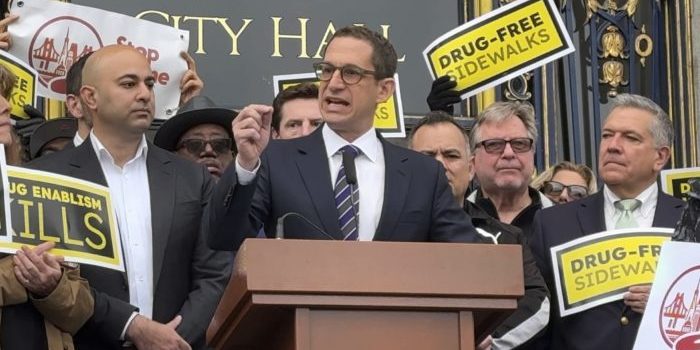(Headline USA) San Francisco’s Board of Supervisors is poised to grant newly elected Mayor Daniel Lurie greater powers and flexibility to expedite the city’s response to a fentanyl crisis that has turned sidewalks into open-air dens of drug consumption and homelessness.
The legislation, which supervisors will vote on Tuesday, eliminates competitive bidding requirements for some contracts and allows the administration to solicit private donations to quickly add 1,500 shelter beds and hire more public safety and behavioral health specialists.
It is the first piece of legislation for Lurie—a Levi Strauss heir and anti-poverty nonprofit founder who had never held elective office until he squashed former Mayor London Breed’s reelection bid last year.
The proposal already has the six votes needed to pass, and will likely pick up more votes Tuesday.
The 11-member board relinquishing oversight powers for an effort with no concrete plan or accountability metrics underscores how desperate supervisors are for a solution. It also signals their embrace—for now—of a political outsider who pledged to work collaboratively to create common-sense solutions.
Supervisor Connie Chan said last week at the budget and finance committee she chairs that board oversight helps ensure taxpayer money is spent judiciously and transparently. But she also said this was “truly an unprecedented time” that calls for unusual measures, and she appreciated the mayor’s willingness to compromise. Breed had a frosty relationship with the board’s progressive members, Chan included.
San Francisco has long been known for its far-left politics, but homeless tent encampments and public drug use surged during the COVID-19 pandemic, as traditionally liberal policies gave way to radical Marxist movements including “Defund the Police” effort and a general disregard for common-sense public-safety laws.
Gov. Gavin Newsom, a Democrat, actively invited more homeless people to move into the state in 2021 while promising to spend billions in tax dollars to provide housing for them.
“We have a responsibility to accommodate and enliven and inspire, and California’s dream is still alive and well,” Newsom said at the time, during a re-election campaign in which he hoped to nail down the homeless vote.
“All people should aspire to that California dream regardless of their income level and regarding their lot in life,” Newsom added.
Overdose deaths fueled by cheap and potent fentanyl reached a record high in San Francisco of over 800 in 2023.
In response, frustrated residents voted to enhance police powers and backed crackdowns on street homelessness. They also elected more moderate Democrats to the board.
Lurie’s proposal would allow the city to bypass the competitive bidding and procurement process for contracts, grants and leases related to addiction, homelessness and public safety hiring. City departments could sign new leases without board approval. He wants to open a 24-hour drop-off center that would be friendly to police and an alternative to jail.
Supervisors would have only 45 days to vote on contracts up to $25 million—down from the original $50 million proposed by the mayor—or relinquish their oversight. Expedited contracting would sunset in one year, down from the original five.
At Wednesday’s budget and finance committee, legislative analyst Nicolas Menard warned that waiving competitive bids would likely increase service costs and “create opportunities for waste, fraud and abuse.” The fiscal impact is unknown, but the grants and contracts budget for the affected city departments totals just over $1 billion.
“I need to be very clear that you’re giving up a lot here,” he said.
Still, it passed out of committee to the full board with a unanimous recommendation and in a statement released later that day, Lurie said that with the ordinance “we are no longer looking the other way—we are treating the fentanyl crisis like the emergency it is,” he said. “This is a new era in City Hall.”
Adapted from reporting by the Associated Press

